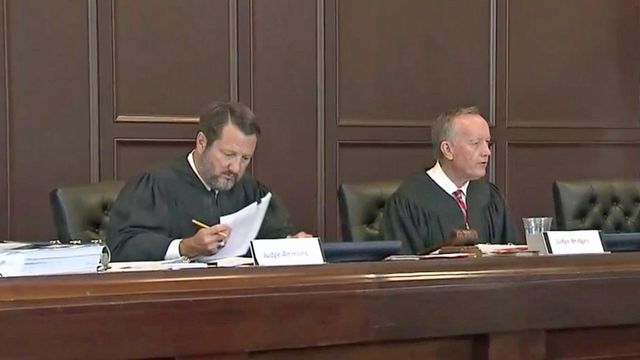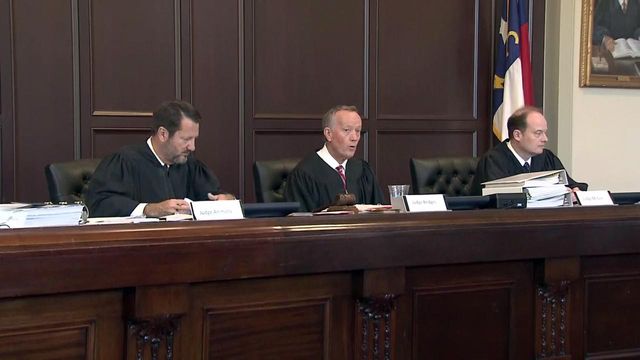NC superintendent, school board await judges' decision in power struggle lawsuit
A three-judge panel will determine who should have the power to supervise the state's 1.5 million public school students and $10 billion-plus budget. The judges ended Thursday's hearing without making a decision. A ruling could come in the following days.
Posted — UpdatedA panel of three Superior Court judges heard arguments from both sides about who should have the power to supervise the state's 1.5 million public school students and $10 billion-plus budget. The judges ended Thursday's hearing without making a decision. A ruling could come in the following days.
At the heart of the legal battle between Superintendent of Public Instruction Mark Johnson and the state board is a law passed in December that would transfer many of the board's powers to Johnson. The board quickly filed suit, claiming the law diminishes the board's constitutional authority and "raises significant legal concerns."
In court Thursday, an attorney representing the state board said the superintendent's role is to be "subservient" to the board's authority.
"Ultimately, the constitutional authority rests with the board," attorney Bob Orr said. "The crux of this case (is) can the General Assembly take this constitutional power and give it to the superintendent?"
The answer is yes, attorneys for the superintendent and state argued.
"When it comes to public schools of North Carolina, the number one authority is the General Assembly," said attorney Hardy Lewis, who represents the superintendent.
Johnson was elected by the voters and works at the state Department of Public Instruction every day, while state board members are appointed by the governor and typically only meet two days a month, Johnson's attorneys said.
"Mark Johnson is responsible to the people of North Carolina. He’s got to run for office in three years," Lewis told the judges.
Judge Forrest Bridges questioned the roles of the superintendent and state board and said he was having trouble wrapping his head around how they should differ.
"What are the specific powers and duties (of each)?" Bridges said. "Where does one begin and where does one end?"
The judges questioned whether lawmakers could redefine the roles of the state's top education leaders.
"If that is the case, what are the limits?" said Judge Martin McGee.
Judge James Ammons questioned whether the General Assembly's authority to redefine the roles is unlimited. If not, where should the line be, he asked.
"I would not say the General Assembly's authority is unlimited," Hardy said. "I don't think the line has been crossed here."
Bridges questioned whether there is "a boundary for what the General Assembly can and cannot do" in cases like this. The judges also considered whether the new law would leave the state board an empty shell or if it would change the fundamental nature of the board.
"This side says we should throw out the whole thing ... The other side says it's fine. It's not as obvious to us as it is to you," Bridges told lawyers for both sides.
In court records, the superintendent says the state board has "severely limited" his authority and has either ignored or denied his requests to make staffing changes at the state education department since he took office in January.
Among his list of complaints, Johnson said the state board routinely appoints committees to vet potential hires for the North Carolina Department of Public Instruction instead of voting on his recommendations for the positions.
The new law would give Johnson some control over the state's education budget, oversight of charter schools and authority to hire senior-level aides. Those powers were previously left to the state school board.
North Carolina is one of about a dozen states in which voters elect a state schools superintendent, but for at least a generation the job has been little more than a cheerleader for public education.
The case hinges on the state constitution declaring the state school board "shall supervise and administer the free public school system and the educational funds provided for its support." The board also "shall make all needed rules and regulations in relation thereto, subject to laws enacted by the General Assembly."
The superintendent is described in the constitution only as "the secretary and chief administrative officer of the State Board of Education." That relationship has been in place since the state's post-Civil War constitution of 1868 and repeated in the current 1971 version, essentially favoring gubernatorial appointees on the school board over the choice of North Carolina voters. But its backers say the school board was created to lessen the politics over assigning education tasks and money.
Politicians have tried several times in the past two decades to undercut or sideline the elected superintendent, but voters have never been asked to change their roles in any of the three dozen constitutional changes since 1971. Lawmakers seriously considered a constitutional amendment in 2011 to give the superintendent more authority, but ultimately couldn't agree.
___
Related Topics
• Credits
Copyright 2024 by WRAL.com and the Associated Press. All rights reserved. This material may not be published, broadcast, rewritten or redistributed.






